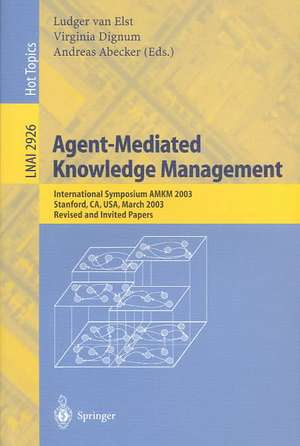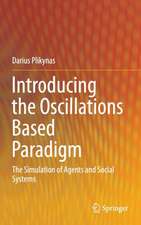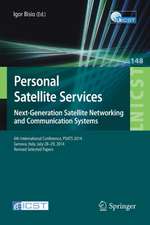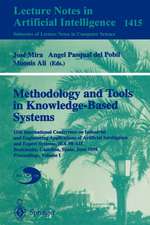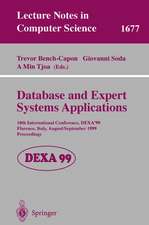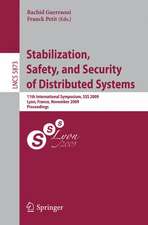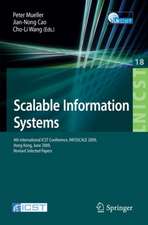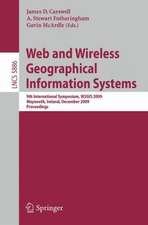Agent-Mediated Knowledge Management: International Symposium AMKM 2003, Stanford, CA, USA, March 24-26, 2003, Revised and Invited Papers: Lecture Notes in Computer Science, cartea 2926
Editat de Ludger van Elst, Virginia Dignum, Andreas Abeckeren Limba Engleză Paperback – 26 ian 2004
Din seria Lecture Notes in Computer Science
- 20%
 Preț: 1061.55 lei
Preț: 1061.55 lei - 20%
 Preț: 307.71 lei
Preț: 307.71 lei - 20%
 Preț: 438.69 lei
Preț: 438.69 lei - 20%
 Preț: 579.30 lei
Preț: 579.30 lei -
 Preț: 410.88 lei
Preț: 410.88 lei - 17%
 Preț: 427.22 lei
Preț: 427.22 lei - 20%
 Preț: 596.46 lei
Preț: 596.46 lei - 15%
 Preț: 448.04 lei
Preț: 448.04 lei - 20%
 Preț: 353.50 lei
Preț: 353.50 lei -
 Preț: 389.49 lei
Preț: 389.49 lei - 20%
 Preț: 309.90 lei
Preț: 309.90 lei - 20%
 Preț: 645.28 lei
Preț: 645.28 lei - 20%
 Preț: 763.23 lei
Preț: 763.23 lei - 15%
 Preț: 580.46 lei
Preț: 580.46 lei - 20%
 Preț: 310.28 lei
Preț: 310.28 lei - 20%
 Preț: 655.02 lei
Preț: 655.02 lei - 20%
 Preț: 1183.14 lei
Preț: 1183.14 lei - 20%
 Preț: 340.32 lei
Preț: 340.32 lei -
 Preț: 449.57 lei
Preț: 449.57 lei - 20%
 Preț: 591.51 lei
Preț: 591.51 lei - 18%
 Preț: 938.83 lei
Preț: 938.83 lei - 20%
 Preț: 337.00 lei
Preț: 337.00 lei - 20%
 Preț: 649.50 lei
Preț: 649.50 lei - 20%
 Preț: 607.40 lei
Preț: 607.40 lei - 20%
 Preț: 1414.79 lei
Preț: 1414.79 lei - 20%
 Preț: 1024.44 lei
Preț: 1024.44 lei - 20%
 Preț: 583.40 lei
Preț: 583.40 lei - 20%
 Preț: 453.32 lei
Preț: 453.32 lei - 20%
 Preț: 575.49 lei
Preț: 575.49 lei - 20%
 Preț: 1075.26 lei
Preț: 1075.26 lei - 20%
 Preț: 585.88 lei
Preț: 585.88 lei - 20%
 Preț: 825.93 lei
Preț: 825.93 lei - 17%
 Preț: 360.20 lei
Preț: 360.20 lei - 20%
 Preț: 763.23 lei
Preț: 763.23 lei - 20%
 Preț: 340.32 lei
Preț: 340.32 lei - 20%
 Preț: 504.58 lei
Preț: 504.58 lei - 20%
 Preț: 369.13 lei
Preț: 369.13 lei - 20%
 Preț: 580.93 lei
Preț: 580.93 lei - 20%
 Preț: 343.62 lei
Preț: 343.62 lei - 20%
 Preț: 350.21 lei
Preț: 350.21 lei - 20%
 Preț: 583.40 lei
Preț: 583.40 lei - 20%
 Preț: 583.40 lei
Preț: 583.40 lei - 15%
 Preț: 438.59 lei
Preț: 438.59 lei - 20%
 Preț: 341.95 lei
Preț: 341.95 lei - 20%
 Preț: 238.01 lei
Preț: 238.01 lei - 20%
 Preț: 538.30 lei
Preț: 538.30 lei
Preț: 341.95 lei
Preț vechi: 427.44 lei
-20% Nou
Puncte Express: 513
Preț estimativ în valută:
65.44€ • 68.07$ • 54.02£
65.44€ • 68.07$ • 54.02£
Carte tipărită la comandă
Livrare economică 14-28 aprilie
Preluare comenzi: 021 569.72.76
Specificații
ISBN-13: 9783540208686
ISBN-10: 3540208682
Pagini: 444
Ilustrații: XI, 428 p.
Dimensiuni: 155 x 233 x 23 mm
Greutate: 0.68 kg
Ediția:2004
Editura: Springer Berlin, Heidelberg
Colecția Springer
Seriile Lecture Notes in Computer Science, Lecture Notes in Artificial Intelligence
Locul publicării:Berlin, Heidelberg, Germany
ISBN-10: 3540208682
Pagini: 444
Ilustrații: XI, 428 p.
Dimensiuni: 155 x 233 x 23 mm
Greutate: 0.68 kg
Ediția:2004
Editura: Springer Berlin, Heidelberg
Colecția Springer
Seriile Lecture Notes in Computer Science, Lecture Notes in Artificial Intelligence
Locul publicării:Berlin, Heidelberg, Germany
Public țintă
ResearchCuprins
Towards Agent-Mediated Knowledge Management.- Towards Agent-Mediated Knowledge Management.- Section I: Collaboration and Peer-to-Peer Support.- Peer-Mediated Distributed Knowledge Management.- The Impact of Conversational Navigational Guides on the Learning, Use, and Perceptions of Users of a Web Site.- Agent-Oriented Knowledge Management in Learning Environments: A Peer-to-Peer Helpdesk Case Study.- Towards Evaluation of Peer-to-Peer-Based Distributed Knowledge Management Systems.- Section II: Agent Based Community Support.- TAKEUP: Trust-Based Agent-Mediated Knowledge Exchange for Ubiquitous Peer Networks.- Knowledge Management Framework for Collaborative Learning Support.- An Agent-Based Approach to Mailing List Knowledge Management.- Section III: Agent Models for Knowledge and Organizations.- Information Fields in Organization Modeling Using an EDA Multi-agent Architecture.- A Quantum Perturbation Model (QPM) of Knowledge Fusion and Organizational Mergers.- Improving Organizational Memory through Agents for Knowledge Discovery in Database.- Experience in Using RDF in Agent-Mediated Knowledge Architectures.- Using an Agent-Based Framework and Separation of Concerns for the Generation of Document Classification Tools.- Section IV: Context and Personalization.- Modeling Context-Aware Distributed Knowledge.- Discovering, Visualizing, and Sharing Knowledge through Personalized Learning Knowledge Maps.- Agentized, Contextualized Filters for Information Management.- Implicit Culture-Based Personal Agents for Knowledge Management.- Section V: Ontologies and Semantic Web.- Integrating External Sources in a Corporate Semantic Web Managed by a Multi-agent System.- Automatically Generated DAML Markup for Semistructured Documents.- A Spreading Activation Framework for Ontology-Enhanced Adaptive Information Access within Organisations.- Ontology Extraction for Educational Knowledge Bases.- Representing Interaction Protocols in DAML.- Adding AI to Web Services.- Section VI: Agents and Knowledge Engineering.- Knowledge Discovery in Databases and Agent-Mediated Knowledge Management.- Intentional Analysis for Distributed Knowledge Management.- Perspectives: An Analysis of Multiple Viewpoints in Agent-Based Systems.- A Multi-agent Architecture for Evolving Memories.- Agent-Mediated Knowledge Engineering Collaboration.- Dynamic Generation of Agent Communities from Distributed Production and Content-Driven Delivery of Knowledge.
Caracteristici
Includes supplementary material: sn.pub/extras
